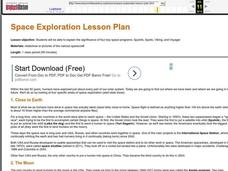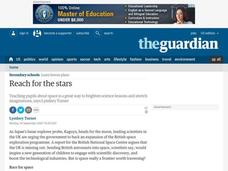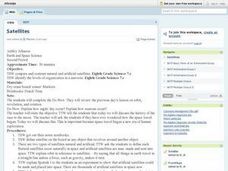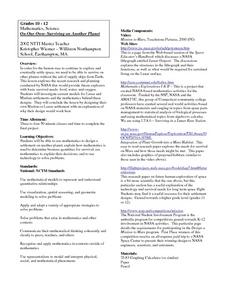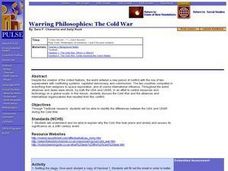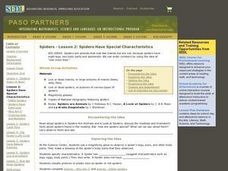Curated OER
Cold War Politics in The Space Race
"Whoever controls space will control the world, " Lyndon B. Johnson said after the Soviet Union successfully launched Sputnik. This fueled the space race and encouraged the United States' goal of landing a man on the moon before the...
Curated OER
1969 Apollo 11 Moon Landing
Provide a little background information and introduce learners to one of the biggest moments in US history: the Apollo 11 moon landing. This news report describes the event, the time, and life in space. This is a report celebrating the...
Alabama Department of Archives and History
America in Space: German Voices from Huntsville, Alabama
Project Paperclip, the Redstone Arsenal, and the Huntsville Space Center are all featured in a resource that investigates the contributions of Dr. Werner von Brawn and other German scientists to the US space program. Working individually...
C-SPAN
On This Day: Apollo 8
Apollo 8—the mission to orbit the moon—changed the trajectory of human history and space travel. A series of videos, including historians, the mission commander, and footage of the mission, allows pupils to watch the mission as it...
Curated OER
Men in Space: From Goddard to Armstrong
Students view "Men in Space: From Goddard to Armstrong," taking a examine the the extraordinary lives of the men who conquered space.
Curated OER
Flight of the Future/Space Flight
Young scholars explore space science by viewing videos on YouTube. In this moon landing lesson, students view clips of Neil Armstrong taking his first step on the moon and discuss the space race between the U.S. and Russia. Young...
Curated OER
Space Exploration
Sixth graders identify and interpret the following: What is space?, Space Race, Living in space?, Man on the Moon, Astronaut training; students compare/contrast US and Russia space exploration. Students write a letter of application to...
Curated OER
Space Exploration
Learners explore the significance of the four space programs: Sputnik, Apollo, Viking, and Voyager. For this space exploration lesson, students view a space exploration slideshow and complete an included chart of space exploration.
Curated OER
Planets And Moons Web Quest
Students work with a partner using the Internet to find the answers to a web quest about space exploration. They work in cooperative groups to discuss information and evaluate its importance to space exploration.
Curated OER
Distinguished Discoveries: Florida quarter reverse
Florida's state quarter has an image of a space shuttle and a Spanish Galleon on its reverse side. Pupils will examine the state quarter and think about how the Spanish explorers and Space explorers are the same and different. The class...
Crash Course
The New Astronomy: Crash Course History of Science #13
Sword duels, religious unrest, war—who says science is boring? Aspiring astronomers discover fascinating facts about the famous scientists that dared challenge the accepted model of the solar system in the 13th video of a 16-part History...
Curated OER
Reach for the Stars
Students consider the significance of space exploration. For this space science lesson, students visit selected websites to discover information about astronomy, lunar missions, and space travel. Students discuss the value of space...
Curated OER
Pioneers In Space
Students discover the meaning of the word pioneer by using a variety of different activities. They are introduced to some of the pioneers of aviation in Ohio. They use coins and conduct research about some of the persons who accomplished...
Curated OER
Satellites
Eighth graders explore the history of space travel and satellites. Through a teacher demonstration, 8th graders observe how a satellite revolves another object. They identify natural and artificial satellites, explore how satellites...
Crash Course
The Americas and Time Keeping: Crash Course History of Science #5
Time, time, time ... see how it shaped an entire culture! Science scholars discover the mysteries of the Mayan and Incan cultures during the fifth video in a History of Science series. The narrator shows how these time keepers developed...
Curated OER
On Our Own- Surviving on Another Planet
Students investigate current models for Lunar and Martian settlements and study the mathematics behind these designs. They design their own Lunar or Martian settlement with an explanation of why their model would work best.
National First Ladies' Library
One Small Step
Learners explore the steps taken to fulfill President Kennedy's promise to land a man on the moon.They examine the costs and difficulties of fulfilling that promise and the historical events that motivated the nation to do so.
Curated OER
The Planets Moon
Young scholars explore the theories of the creation of the universe and examine the properties of celestial bodies. They analyze the relationship between the sun, Earth and other planets. They discover the infinite potential of the...
Curated OER
Warring Philosophies: The Cold War
Students explain why the Cold War took place and ended. They analyze its significance as a 29th century event. Students identify the differences between the USA and USSR during the Cold War.
Curated OER
Spiders Have Special Characteristics
Learners state reasons why spiders are grouped in specific categories, including what distinguishes a spider from an insect. They report on their observations of the spiders. They illustrate their report with drawings in their journals.









